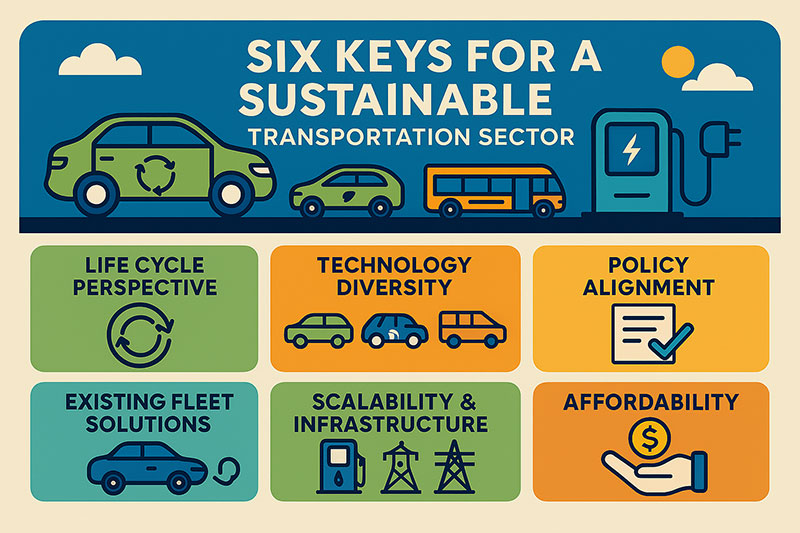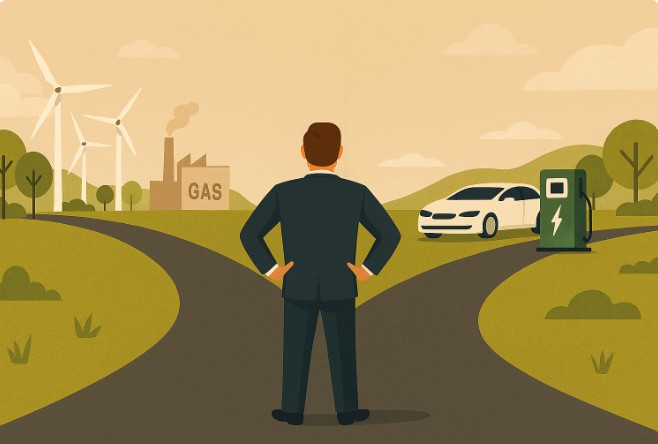May 10, 2022
Stephen Hightower is the Chief Operating Officer of Hightowers Petroleum Company – a leading energy supplier in North America. Over their 40 years of existence, Hightowers has consistently navigated the changing conditions of the transportation energy industry to seek new opportunities for growth. Much can be learned from their progressive stance on things like Environment, Social, and Governance planning and performance and how their core values impact their ability to evolve.
Guest:
Stephen Hightower, Chief Operating Officer, Hightowers Petroleum Company
Transcript:
Speaker 1 (00:03):
Welcome to Carpool Chats, a podcast brought to you by the Transportation Energy Institute.
John Eichberger (00:09):
Hey, everybody, welcome back to Carpool Chats. I’m John Eichberger with the Transportation Energy Institute. Thank you for joining us. I’m thrilled today to have a good friend of mine, Stephen Hightower of Hightowers Petroleum, joining us to talk about his company’s approach to the market and the evolution of the transportation energy sector. Stephen, thanks for joining us at Carpool Chats.
Stephen Hightower (00:26):
Thank you very much, John. I’m glad to be here, and it’s good to see you.
John Eichberger (00:30):
A couple months ago, you posted a video on LinkedIn that I was captivated by. I think I watched it three or four times. In there, one of the things you talked about was how your organization, you guys are basically an energy distributor, petroleum. You think about that sector, so many companies that are petroleum distributors, they look at the changing market, and they kind of deer-in-the-headlights panic. “Oh my goodness! What are we going to do? Our business is under attack!” You guys have a corporate philosophy that really kind of positioned you to take advantage of changing dynamics. Can you kind of walk us through, a little bit, how you approach looking at this evolving transportation energy market, what you guys have done to take advantage of it?
Stephen Hightower (01:05):
Absolutely. Thank you. Our philosophy is let’s listen to our customers. Let’s pay attention to what our customers want and need, and not be so stuck into what we want, or our ways, or our ways of selling, and our products, but to really be there listening, soliciting feedback from our customers and be responsive to their changing needs, in that our company isn’t set. Our priority is servicing our customers, and making sure that we are there for them. And that allows us to be forward thinking. So as they’re looking at how do they reduce their carbon footprint, how do they make social change, how do they make an impact, we’re there listening and becoming partners with them. So we’ve been able to, in a couple categories, to be able to be responsive to them. We’ve been in the liquid fuels business since 1981. And there’s been so many changes in that industry alone to where back in the ’80s there was still very high sulfur, and all kinds of things to where emissions and carbon output was not even a thing. But there’s been so many changes there, so that we’re looking at both cleaner fuels, cleaner renewable fuels, things that we can do with our existing systems.
Stephen Hightower (02:37):
But also looking at other things, like how do we get into the EV markets, how do we start to build a business model that is looking not just in the next two to three years but 15 and 20 years down the line, so that we are prepared to be. And our philosophy is we’re going to service. We’re going to provide what our customers want, and we’ve been able to build a brand and reputation with our customers, so that we want to be with them for the long-term and regardless of how we service them, and what products will be there for them.
John Eichberger (03:16):
Yeah. I think that customer centric approach is so critical. I give a lot of speeches throughout the year, and everybody always asks me about the electric vehicle market, you know when should I get into it. And my comments always, “You could pay attention to the headlines. You can pay attention to the trends. But pay attention to your market, because Ohio is not the hotbed for a vehicle market penetration.” Yet you guys have made the investment to get into the EV market because you see the writing on the wall. But you’re also, if you’re paying attention to your local market, that’s when you really identify the timing. And I think that’s fantastic. Gorgeous you guys to be actually moving into that sector now when the EV market and your core markets are not really developed, but being prepared for that in the long-term is really critical. And how did you guys come about? Clearly you pay attention to your customers, but that long-term view. So many companies don’t have that 10, 15, 20-year perspective. How is that ingrained inside your culture.
Stephen Hightower (04:13):
One of the things to be a part of great organizations, like the Transportation Energy Institute, and SIGMA, and NASTC, listening to what is coming, and what is coming next. So part of the philosophy is let’s learn. Let’s not bureaucracy our head in the sand, but let’s look up and learn what’s out there.
Stephen Hightower (04:35):
5, 10 years ago everybody, “Oh, what are doing in renewables?” It’s not quite there yet, but we’re learning, and we’re setting up supply chains, and building up relationships now for what is to come. And having customers like General Motors who are based here in the Midwest, even though the infrastructure’s not there, we’re involved in their testing. And that allows us, when they ask us, when they look to us, what is your solution, we have been in the market place within the industry looking at these solutions and are prepared. So, I give a hat tip to my father who’s always been forward looking, and has taught that to me, and that’s just become built within our organization, that we really want. That we have to be ahead of the curve.
Stephen Hightower (05:35):
Now, there’s a balance of where you want to get into that curve. They’re a lot of investment and time that other companies have done, but we want to catch the curve right before that hockey stick goes up, but not be too late to be sitting outside in the dust. So when our customers ask us, we want to be prepared to offer those solutions. And that’s just years and years of being a part of great organizations, like the Transportation Energy Institute.
John Eichberger (06:06):
Well, I think it’s funny because I look back at the video I saw you do, and you talked about leading not reacting. And so often we get stuck sitting, okay. What’s going to happen? How do I react to the market? But you guys have really taken the proactive approach to say, “We want to understand what are the fundamentals in the market? What are our customers talking about,” but also, how can we lead and become that catalyst for change in a positive way. That’s a testament to your salespeople and the culture you guys have built in the organization.
Stephen Hightower (06:39):
Yeah, and that’s what it takes. And that’s why we are in business to be leaders, and to… As someone who’s grown up in that in between a digital native and somebody who could see that tie between the generations, I’ve seen the evolution of technology and I know what happens to companies that don’t react. I’ve seen the BlockBusters, and the Sears, and all those companies who weren’t able to react. And frankly, I don’t want to be that. So, having to learn their lessons, and to make sure because I’m a third generation, and we currently have the fourth generation working. And so part of that is saying, “Not only is it my responsible to be profitable today, but to build businesses that last for subsequent generations.” And part of that is really why we take that approach, because we’re thinking not just for ourselves but for generations to come.
John Eichberger (07:50):
So for the petroleum distributors who might be watching this or listening to it, maybe thinking, “Okay. You haul liquid fuels. That’s what your core business is,” what are you guys doing in the EV space? So, how are you guys participating in that growing market?
Stephen Hightower (08:04):
So, there’s a couple different ways. A: to be able to offer various charging stations. So, we’ve partnered with various companies to be able to be distributors or marketers for them, and also to be able to put together a supply chain to be able to do the installation of those. So, we have customers like FedEx, Waste Management, State of Ohio, City of Cincinnati, large customers that are looking at this and really as a look at what’s coming down in the transportation bills, the infrastructure bills, that there is financing that really should be looked at as a once in a lifetime. We don’t know that a tranche of finances is going to come down in 10 years when everybody wants a charging station. That finance might not be there. So, we’re really saying how do we approach our customers who are looking at transferring their fleet. We can both offer charging stations and a turnkey solution. And there’s how do you participate on the electric side. That’s still a question in a lot of states. Those are going through state legislatures all across the country right now, so that’s a question mark. But we have the technology and the installation capabilities to be able to install that across the country.
John Eichberger (09:41):
I think it’s critical. You mentioned the federal funding and the state funding. That’s not going to last forever. And ultimately one of things that we’re to do at the Transportation Energy Institute is figure out how do you build a business case, so that independent companies like yourselves, and your client, and your customers, they say, “You know what? I’m going to invest in this because there’s an ROI here.” And I think one that’s that’s been missing out there is this idea of build, build, build, invest, invest, invest, subsidize, that’s fine early stages. But if we can’t develop an ROI on EV charging infrastructure, it’s not going to grow. It’s going to hit a point and it’s going to stop. And the whole evolution to more of an electrified powertrain market is really going to stymie.
Stephen Hightower (10:20):
Yeah. And I’m still a believer in liquid fuels. And the electrification push has also pushed us to become cleaner in how we deliver our liquid fuels, and the renewables, and everything is getting cleaner. So that pressure is going to reduce as liquid… So, I believe that there’s still going to be a need for both. But again, I think it’s going to be a mixture of things. And so we want to make sure that as we’re looking, we’re not just abandoning liquid fuels and the network that is proven, and that is sound, and that’s getting cleaner and cleaner.
Stephen Hightower (11:08):
But I foresee the truck stops of the future. You’re going to have renewable diesels. You’re going to have charging stations. You’re going to have some other mix. And then it’s all about creating that atmosphere. Somebody needs to take 30, 40 minutes to charge. What services are you offering inside of the store to be able to take advantage of that and then offer other things while? So, it’s a new mix that’s still being figured out, but it’s going to be a combination. The goal right now for a lot of companies is to say, “We’re going to be 100% electric.” I don’t think that that will happen, but it’s going to be a part of the mixture and we have to be a part of that.
John Eichberger (11:59):
I agree 100%. There’s a lot of forecasts, a lot of projection, a lot of pledges that are very aspirational in nature. But I’ve been saying for a while that they’re kind of predicated on a perfect market. And you don’t anticipate supply chain shortages. You don’t anticipate microchip shortages. All these things impede the progression to those aspirational goals. Clear. You got to set a goal, and then where you end up makes sense. But I think I agree. I think there’s going to be a point where EVs are going to gain market share to a certain level, and they’re probably going to balance there, and we have to deal with the rest of the market.
John Eichberger (12:31):
And you mentioned going green and getting cleaner. There are external pressures. I’m wondering. Are you guys starting to feel some of the external pressures from your customers, your suppliers to be more accountable for them, and to contribute to their overall, I guess, ESG scorecard? Because that’s starting to become so much more of a key issue that we’re being rated on our environmental social governance approach. But SEC is now saying some publicly traded companies may have to account for their suppliers as well. Is that influencing some of your decisions now?
Stephen Hightower (13:03):
Absolutely. And really start to see it post-pandemic. We all started coming back to the workplace, and all you heard in conferences and meetings is ESG, ESG. And so that caused us to say, “Let’s really look at this, and let’s make sure that we’re responsive.” Again, it’s do you want to be left behind because they could go to, “Hey, Hightower, you don’t have your act together. You’re not looking at this. This is the perfect time for us to transition to another.” We said, “No. Let’s stop.” And we put, again, went out to the market place. And right now, I can’t announce it right now, but we’re becoming one of the international leaders of renewable diesel. We’re becoming their first channel partner outside of the State of California to be able to bring them to General Motors, and to Honda, and FedEx because they are looking for that. And right now, a lot of it is testing. But now there needs to be distribution network that’s built in. And so how do we become, again, leading and saying, “We can’t wait until this comes.” But now we’ve got to find, because we understand that network, that logistic network. You have to storage. You have to have terminals, and railcars, and putting that piece together that some of these new entrants in the market don’t want to be in or don’t have the expertise in.
Stephen Hightower (14:37):
So, we can come in with our knowledge of how to get that last mile and get product from A to B, and apply that. But we have to be working on that, and so this deal that we’re very excited to announce, and it should be by the time of your conference that we can announce this. But to be a channel partner bringing this product into this Midwest. So, we’re really trying to… We are actively responding to that. And GM, they are leading in a sense. They changed the game, and we deliver fuel to every vehicle off of a GM assembly plant in North America. And we’ve done that for the past since 2009. And to really say, “We want to continue this relationship. Hightower, you have served us well and we want to continue with this, but you have to meet this challenge.” And it was a catalyst for us to go into these markets, and now we’re able to expand that. And it’s transforming our business, and I know that so we have relationships with Ford, GM, Chrysler, et cetera, so that we will be able to grow those, and be there for when they transition.
John Eichberger (16:10):
But you mentioned renewable diesel. And I think getting it spread outside the LCFS market in California’s going to be important if we’re going to reduce the carbon footprint of transportation. The other thing is that a great fuel, and biodiesel as well going into the heavy duty, medium duty market. We just published a paper early April that identified the different categories of vehicles in the medium, heavy duty space, their use cases, their energy needs, their GHT emissions profile, all those things. And what it basically come out with is we cannot take a light duty vehicle solution and apply it to the medium, heavy duty market as blanket because it’s not going to work. We need customized solutions. Liquid fuels are going to be so critical to that sector for so much longer than the light duty sector because of the power needs, the energy to weight ration, all those different things. And having products like renewable diesel, biodiesel, and those type of lower carbon liquid fuels throughout the country is going to be so important if we’re actually be serious about reducing the carbon footprint of that sector.
Stephen Hightower (17:12):
I agree. And we’ve got to find where. I encourage other companies. You have to find where your lane is, and where do you play in this, and how can you contribute. And knowing that it’s starting with the Fortune 50 companies, but it is really spreading fast in terms of being responsive to both either shareholders, but also now, as you said, as you alluded to, the SEC is now putting some regulations on. So, it’s going to become so where do you fit into this mix, and developing that niche, and really making sure that you have an open supply chain that can be responsive to that.
John Eichberger (18:05):
And I think one of the things that’s a critical message here is whether you believe personally that climate change is a crisis or not really doesn’t matter anymore. There’s still a lot of people out there trying to argue that, and that’s fine. I get a kick out of watching the debates. But the bottom line is, it’s beyond policy. It’s going into business relationships. And the pressure’s on the market to respond to those inputs is not going to go away. This is not a temporary thing. Making long-term meaningful changes to improve the environmental performance of the transportation space is something that we all have to take seriously because it’s not going away. And you guys wouldn’t be investing in this stuff if you thought it was a temporary fad, right?
Stephen Hightower (18:49):
Absolutely. Right. And so what’s happening is that because, frankly, Washington is so dysfunctional on both sides.
John Eichberger (18:59):
No, really?
Stephen Hightower (19:03):
And so corporate America has now had to take the mantel and lead, and be responsive to their customers and for what they see. And even you can argue climate change all you want. We all want to breathe clean air. I say “Even you take the biggest climate denier, if you put them in the middle of Beijing and their kids had to suffer with asthma and all those things, they’d be singing a different story.” So having that renewable look to say that, again, looking not just today but looking towards the future 50, 75, 100 years from now, we got to start. And there is a need. And I think corporate America got tired of going with the swings of back and forth with who’s in office and being responsive and said, “Hey, look. We got to set a course and stick with it,” and they’ve done that. And as suppliers, we must be in line with that. And it’s not because I do consider myself somebody who cares about the earth, and the environment, et cetera. But that’s separate than how we manage and make business decisions. And so we’re lining up with the business environment of today, and being responsive to that, and seeing how do we sustain our business throughout these changes.
John Eichberger (20:46):
And that’s the key. The main difference between the government saying, “Do this,” and industry and business saying, “We’re going to do this,” is when the market finds solutions to reduce emissions, they also find solutions that make economic, long-term, sustainability sense. Because they know that solutions that bankrupt companies will not survive.
Stephen Hightower (21:08):
Correct.
John Eichberger (21:08):
Solutions that hurt consumers financially will not survive, so we need to have that balance between what makes long-term financial sense while at the same time improving the environment. That’s the best solution comes from the market. So, it’s very encouraging to hear organizations like yours that are taking it seriously and finding those solutions that make the most sense.
Stephen Hightower (21:30):
Absolutely. And you have to be able to pivot, and you have to be able to, again it goes back just to listening to your customer, and being responsive to their needs. And this is where we’re at, and we’re excited to be a part of that, and then build our own business model and our business plan based upon that.
John Eichberger (21:59):
Stephen, thank you so much for joining us at Carpool Chat. I’m really looking forward to Fuels 2022. For you guys listening at home, Steve’s going to join us. He’s going to be one of our keynote speakers, share his vision on where the market is, how to succeed in the changing market. You guys are doing great stuff, Stephen. So again, thank you very much for everything you guys are joining. Thanks for joining us today, really appreciate it.





